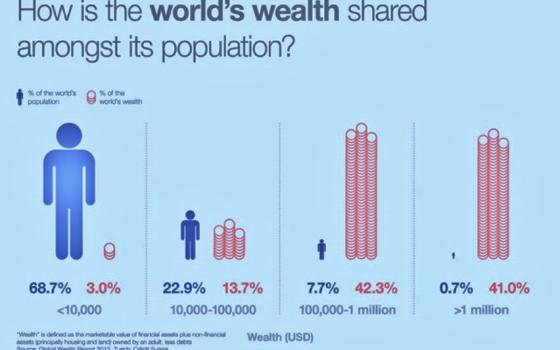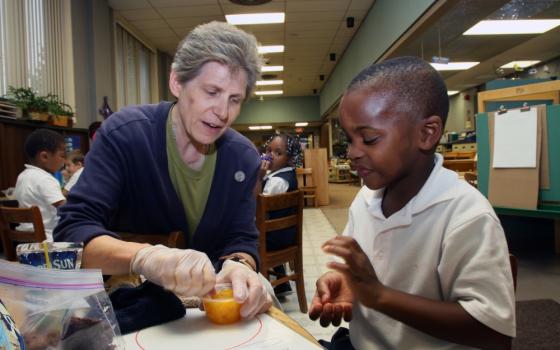A number of years ago several of us were given the opportunity to visit Phyllis, one of our sisters who ministers in Peru. Because I had been living and volunteering at a Catholic Worker House, I asked if there were any soup kitchens we could visit. So Phyllis took us to a comedor on the outskirts of town, operated by a young woman named Celia out of her home. She was supplementing the diets of the young children in her neighborhood and helping the mothers learn about good nutrition.
Now, her home lacked electricity, running water and even a constructed floor, but not joy, generosity and a commitment to make life better.
Celia and the other women cooked the food on a makeshift stove outside, their capacity limited by the lack of utensils. At the end of our visit, we took Celia on a shopping trip to the market where she purchased a large pot, another small pan and a large spoon. For around $25, she was able to double the number of children they could feed!
Most people who know me would not consider “frivolous” an apt description. But that’s how I felt when visiting Peru, faced with the realities there and my life here in the United States. How little thought I give to how I spend $25, or even how I spend my time!
I was haunted by the Gospel story of Lazarus and the rich man and the chasm between them, between Celia and myself, the people of Peru and the people of the U.S. The chasm of the here and now, not the thereafter.
I carry that experience, chasm and all, within me – usually just below the surface. From time to time it erupts into consciousness, especially when I hear about such things as the amount of money that is spent on cosmetics, pets, casinos or the latest, most popular movie. Or on U.S. elections. Or on weapons and wars.
The chasm is opening up, becoming wider and wider. Is it in danger of becoming fixed, unable to be crossed?
In January 2015, Oxfam released a report with some startling facts: In 2014, the richest 1 percent of people in the world owned 48 percent of global wealth.
And the gap is growing worse: In 2010, it took 388 billionaires to equal the wealth of the bottom half of the world’s population; by 2014, the figure had fallen to just 80 billionaires. The top 1 percent will have more wealth than the remaining 99 percent of people in just two years.
The inequities are glaring: 3.5 billion people share between them the same amount of wealth as that of these extremely wealthy 80 people. According to the World Economic Forum, in developed and developing countries alike, the poorest half of the population often controls less than 10 percent of its wealth.
This map animates the size of each country to show the number of people living there at a given income level. It’s obvious where the greatest concentration of wealth is, regardless of how many people live in a particular nation.
Even in the U.S., it’s not what we think. The disparity is startling. (See the video at the end of this blog.)
I don’t have a quick fix for mending this chasm but I do know it will take a conversion . . . of structures, of lifestyles, of attitudes. And now is the time to enter the process, during this Lent.
One year I read that the word “conversion” comes from root words that mean “to turn” and “together.” Yes, that’s what is needed: turning together. Seeing Lazarus, knowing both Lazarus and the rich man as brother (and sister), turning toward one another and making our way together. All of us.
I hope the traditional Lenten practices of prayer, fasting and almsgiving help me do some turning this year. Will I take more time to contemplate; taking a long, loving look at the real and trying to get in tune with God’s desire for us all? As far as fasting . . . will I find some ways to use less of Earth’s precious resources, engage in a few Isaiah 58 practices and let go of some my ingrained attitudes of white privilege? With almsgiving, will I be more generous and devote time to systemic change, like participating in NETWORK’s “Lent for the 100%”?
I see I’ll need the faith, energy, compassion and commitment to the common good of Celia to turn.
[Jan Cebula, OSF, is liaison to women religious in the United States for Global Sisters Report.]

